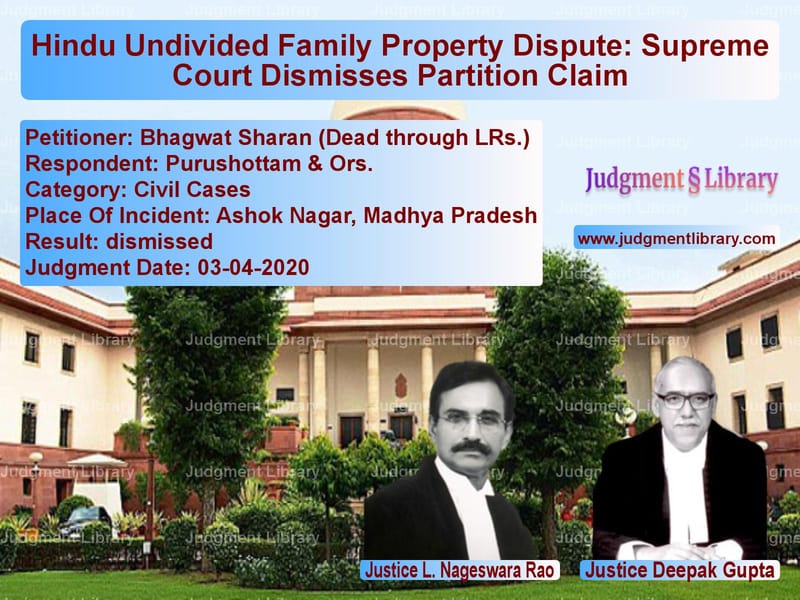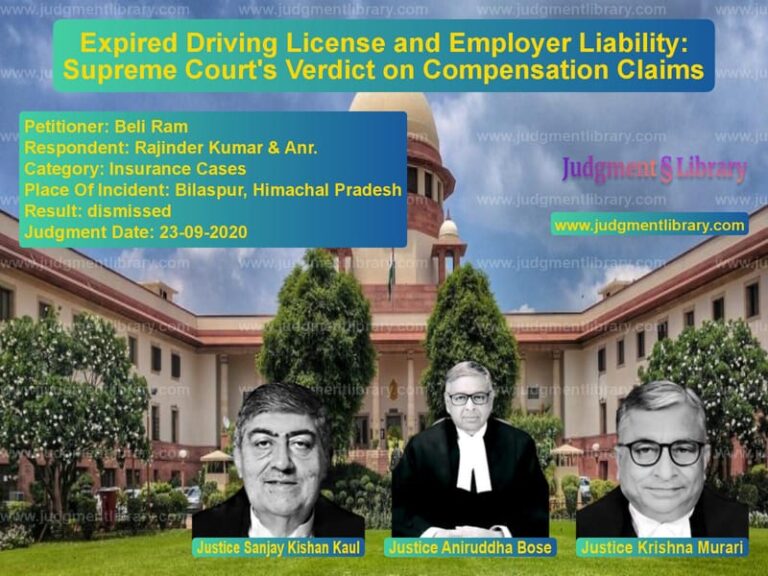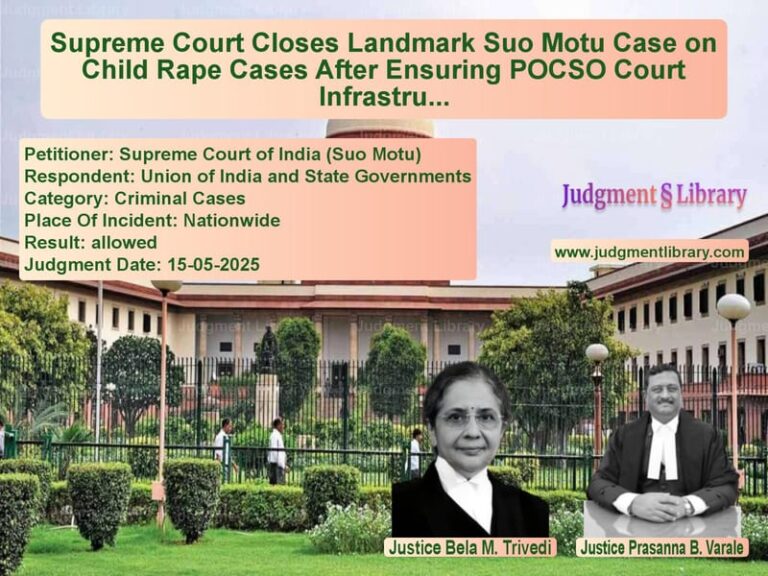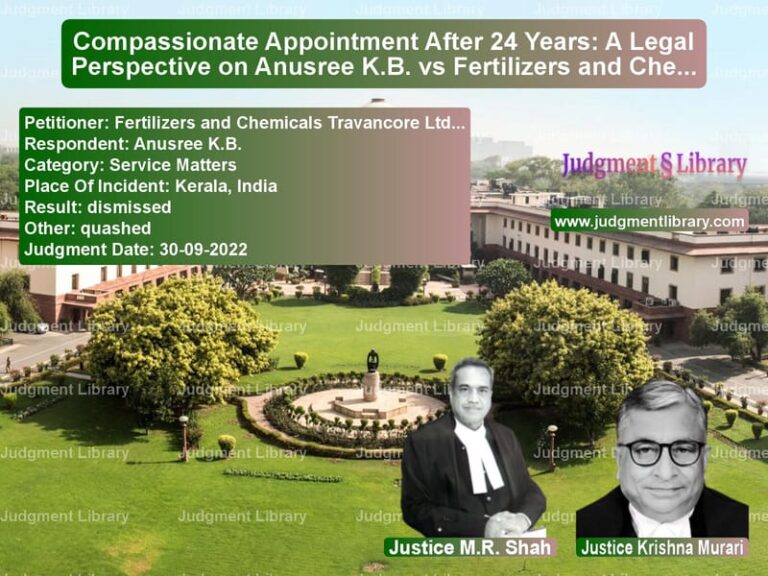Hindu Undivided Family Property Dispute: Supreme Court Dismisses Partition Claim
The legal dispute in the case of Bhagwat Sharan (Dead through LRs.) vs. Purushottam & Ors. revolved around the ownership and partition of properties allegedly belonging to a Hindu Undivided Family (HUF). The core question was whether the disputed properties were part of a joint family estate or had been individually acquired by members of the family. The Supreme Court, after detailed examination of the facts, dismissed the claim for partition, ruling in favor of the respondents.
Background of the Case
The case originated from a family settlement concerning properties and businesses established in Ashok Nagar, Madhya Pradesh. The lineage traced back to one Mangat Ram, a resident of Village Narnaul, Rajasthan. Mangat Ram had four sons: Madhav Prashad, Lal Chand, Ram Chand, and Umrao Lal. Over time, the family members moved from their native village and set up businesses in Ashok Nagar.
The dispute arose when the appellant, Bhagwat Sharan, claimed that various properties, including residential houses and agricultural lands, were jointly acquired by his ancestors as part of an HUF and should be partitioned accordingly. The respondents, on the other hand, argued that the properties were individually acquired and not part of an HUF.
Key Issues Before the Court
- Was there sufficient evidence to prove that the disputed properties were part of a Hindu Undivided Family?
- Could the properties acquired by individual family members be considered joint family assets?
- Were the sales and transfers of some properties by individual members legally valid?
- Did the petitioner’s acceptance of benefits under a will affect his legal standing in claiming joint ownership?
Petitioner’s Arguments
- The appellant contended that the family operated as an HUF and that all properties in question were acquired jointly.
- He argued that the business “Munshi Madhav Prashad” was a joint family business and that its proceeds were used to purchase the properties.
- It was claimed that certain properties were registered in the names of individual family members merely for convenience and tax purposes but remained joint family assets.
- The appellant further argued that the agricultural lands were cultivated collectively and should be considered part of the joint family estate.
Respondent’s Arguments
- The respondents denied the existence of an HUF and contended that the properties were individually acquired.
- They highlighted that separate businesses were established by different family members, suggesting the absence of joint family ownership.
- They pointed out that sales of properties by individual members had gone unchallenged for decades, proving that the properties were privately owned.
- The respondents emphasized that the appellant had previously accepted a will executed by Hari Ram, under which he received a share of the properties, contradicting his claim that the properties were jointly owned.
Supreme Court’s Observations
The Supreme Court extensively analyzed the documentary evidence and past transactions. The Court emphasized the following legal principles:
- There is no automatic presumption that all properties owned by a Hindu family are part of an HUF. The burden of proving joint family ownership lies with the claimant.
- Simply conducting business together or living jointly does not establish the existence of an HUF.
- The properties were registered in the names of individual family members, and there was no proof of a common ancestral fund being used for purchases.
- Past sales of some properties by individual members without objection further indicated separate ownership.
The Court stated, “The law is well settled that the burden is on the person who alleges that the property is a joint property of an HUF to prove the same.“
Final Judgment
The Supreme Court dismissed the appeal and upheld the High Court’s decision, concluding that:
- The properties were not part of an HUF, and the claim for partition was baseless.
- The appellant had accepted benefits under a will, thereby estopping him from challenging individual ownership.
- The agricultural lands in question were also ruled to be privately owned.
- No division of assets was ordered, and the Court upheld the dismissal of the partition suit.
Implications of the Judgment
This ruling reinforces the legal principle that the burden of proving joint family ownership lies with the claimant. It also highlights the importance of documentary evidence and consistency in legal claims regarding property ownership. The judgment serves as a reminder that merely asserting joint ownership without proof will not suffice in property disputes.
Petitioner Name: Bhagwat Sharan (Dead through LRs.).Respondent Name: Purushottam & Ors..Judgment By: Justice L. Nageswara Rao, Justice Deepak Gupta.Place Of Incident: Ashok Nagar, Madhya Pradesh.Judgment Date: 03-04-2020.
Don’t miss out on the full details! Download the complete judgment in PDF format below and gain valuable insights instantly!
Download Judgment: Bhagwat Sharan (Dead vs Purushottam & Ors. Supreme Court of India Judgment Dated 03-04-2020.pdf
Direct Downlaod Judgment: Direct downlaod this Judgment
See all petitions in Property Disputes
See all petitions in Succession and Wills
See all petitions in Contract Disputes
See all petitions in Judgment by L. Nageswara Rao
See all petitions in Judgment by Deepak Gupta
See all petitions in dismissed
See all petitions in supreme court of India judgments April 2020
See all petitions in 2020 judgments
See all posts in Civil Cases Category
See all allowed petitions in Civil Cases Category
See all Dismissed petitions in Civil Cases Category
See all partially allowed petitions in Civil Cases Category







